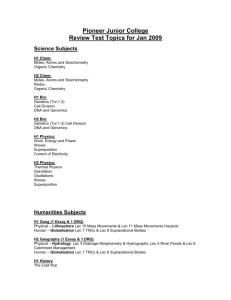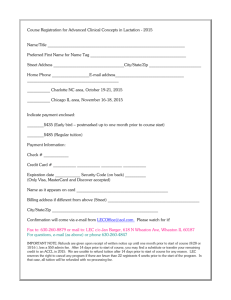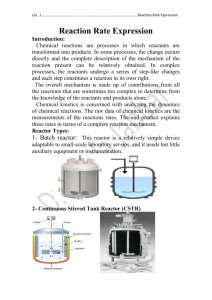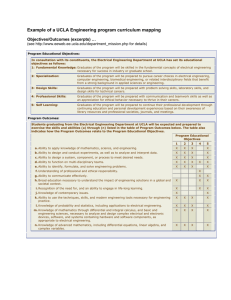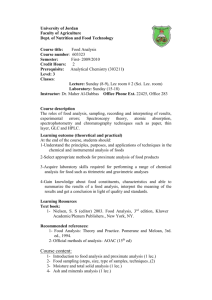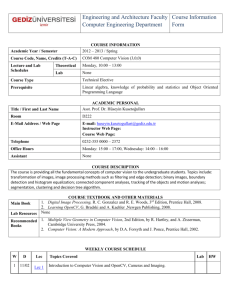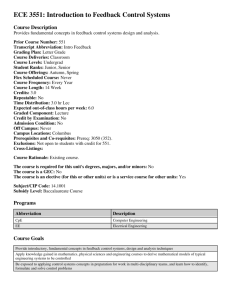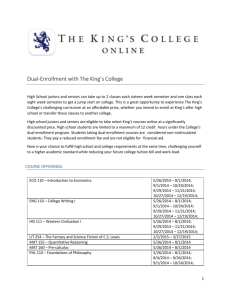SPAN 140
advertisement
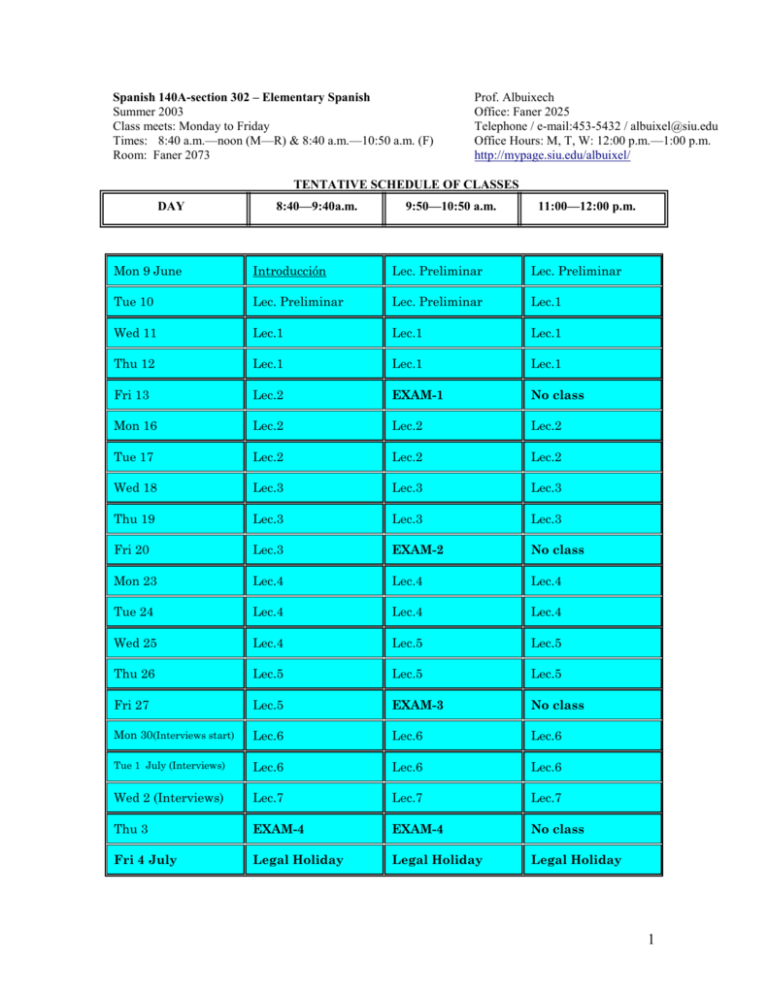
Spanish 140A-section 302 – Elementary Spanish Summer 2003 Class meets: Monday to Friday Times: 8:40 a.m.—noon (M—R) & 8:40 a.m.—10:50 a.m. (F) Room: Faner 2073 Prof. Albuixech Office: Faner 2025 Telephone / e-mail:453-5432 / albuixel@siu.edu Office Hours: M, T, W: 12:00 p.m.—1:00 p.m. http://mypage.siu.edu/albuixel/ TENTATIVE SCHEDULE OF CLASSES DAY 8:40—9:40a.m. 9:50—10:50 a.m. 11:00—12:00 p.m. Mon 9 June Introducción Lec. Preliminar Lec. Preliminar Tue 10 Lec. Preliminar Lec. Preliminar Lec.1 Wed 11 Lec.1 Lec.1 Lec.1 Thu 12 Lec.1 Lec.1 Lec.1 Fri 13 Lec.2 EXAM-1 No class Mon 16 Lec.2 Lec.2 Lec.2 Tue 17 Lec.2 Lec.2 Lec.2 Wed 18 Lec.3 Lec.3 Lec.3 Thu 19 Lec.3 Lec.3 Lec.3 Fri 20 Lec.3 EXAM-2 No class Mon 23 Lec.4 Lec.4 Lec.4 Tue 24 Lec.4 Lec.4 Lec.4 Wed 25 Lec.4 Lec.5 Lec.5 Thu 26 Lec.5 Lec.5 Lec.5 Fri 27 Lec.5 EXAM-3 No class Mon 30(Interviews start) Lec.6 Lec.6 Lec.6 Tue 1 July (Interviews) Lec.6 Lec.6 Lec.6 Wed 2 (Interviews) Lec.7 Lec.7 Lec.7 Thu 3 EXAM-4 EXAM-4 No class Fri 4 July Legal Holiday Legal Holiday Legal Holiday 1 Course Description Spanish 140A--Elementary Spanish. The basic skills of listening, speaking, reading, & writing. No previous knowledge required. Course Objectives By the end of Spanish 140a, you should be able to do the following in terms of each language skill: 1. Listening: Understand Spanish spoken at a slower than normal pace, understand some Spanish spoken directly to you at a normal pace and dealing with familiar topics. Generally, you will understand the gist and principal facts, but not necessarily all the words and finer details. 2. Speaking: Handle greetings, introductions, ask and answer questions on a variety of everyday topics, describe people and places, narrate events in the present and have some ability to narrate events in the past; participate in short conversations, and create with the language. You will be understandable to most native speakers of Spanish. 3. Reading: Read almost any simple, culturally nonspecific Spanish text and also be able to profit from reading materials written for native speakers of Spanish. 4. Writing: Develop writing skills similar to your speaking skills in terms of ability to describe, narrate in the present and past, and so on. 5. Culture: Acquire elementary historic and cultural knowledge about the Spanish- speaking world and its peoples. Required Books 1. ¡Hola, amigos! (Fifth edition)—Jarvis, Lebredo, & Mena-Ayllón 2. ¡Hola, amigos!: Workbook/Lab Manual/Video Manual—Jarvis, Lebredo Course Requirements Attendance: Regular attendance is expected. You are allowed a total of 4 unexcused absences; that is, four hours—NOT four days. Each unexcused absence thereafter will result in a 1% deduction from your final grade. 2 Preparation and Participation: You are expected to be always prepared to participate actively in the classroom activities, which may range from answering questions and writing on the chalkboard to presenting short dialogues—you cannot participate if you are absent. (Worth 10% of the final grade). NOTE: You are strongly advised to keep me informed of any difficulties you may be experiencing during the term. These include illnesses and personal crises which might prevent you from attending, participating, or performing well in class. Written homework: There will be several written homework assignments. Each one will be due on the day for which it is assigned—LATE ONES WILL NOT BE ACCEPTED. (Worth 10% of the final grade). Quizzes: You will have 4 pop quizzes. Each will be worth 2.5% of your final grade and will be on the material covered since the exam prior to that quiz. (Worth 10% of final grade). Exams: You will have 3 one-hour exams and 1 two-hour exam (the last exam). Each exam will be worth 15% of your final grade and be on the material covered during that week—about 12 hours of instruction. (Worth 60% of the final grade). Oral Exam: Near the end of the course you will have a 10-minute oral interview with me during which your overall oral/aural proficiency in Spanish will be assessed. Further details will be discussed later. (Worth 10% of your final grade). Lab attendance: You are required to spend a minimum of 45 minutes per Lección in the Language Media Center (LMC). This is part of the homework grade. LMC is in Faner 1125; Hours: M-R 8a.m.-8p.m., F 8a.m.-4p.m. NOTE: Students who quit attending this class and do not officially withdraw (from the course) before the drop deadline will receive an “F” as final grade. 3 Grading In summary, the course grade will be computed as follows: Grading Scale: PREPARATION & PARTICIPATION 10% 90-100% =A WRITTEN HOMEWORK (# ?) + LAB 10% 80-89% =B EXAMS (4 X 15) 60% 70-79% =C QUIZZES (4 X 2.5) 10% 60-69% =D ORAL EXAM 10% 0-59% =F TOTAL 100% 4 Spanish 140A Oral Interview During the Entrevista explanations in English are unnecessary. Our purpose is to determine the degree to which you are able to use the Spanish language to negotiate meaning in a real situation. By the end of the course you should be able to perform AT LEAST the following basic tasks: 1. Handle greetings; 2. Request and give information concerning names and phone numbers; 3. Describe your surroundings in simple terms; 4. Request and give correct time; 5. Discuss month, season; 6. Discuss the courses you and/or others are taking; 7. Arrange payment of tuition; 8. Give and request information regarding origins and place of residence; 9. Discuss plans and activities (using present of different verbs, tener que + infinitive, ir a + infinitive); 10. Talk about what you like and dislike to do; 11. Talk about how you feel (i.e. estoy bien, mal, cansado/a, ...; tengo calor, sed, ...); 12. Talk about your age (i.e. tengo veinte años); 13. Extend, accept, and decline invitations; 14. Handle informal social situations such as parties; 15. Make comparisons 16. Open an account and cash checks at the bank; 17. Mail letters and buy stamps at the post office; 18. Shop for clothing and shoes, and discuss sizes, styles, and colors; 19. Discuss past actions and events You will be graded on: Communication 50% (degree to which we understand each other) Vocabulary 20% (your knowledge of the expected vocabulary) Accuracy 10% (grammatical agreement in your sentences) Fluency 10% (your ability to verbalize your ideas smoothly) Pronunciation 10% (clarity and coherence of your speech) 5 Spanish 140A Summer 2003 Prof. Albuixech The following “Calendarios” are tentative. CALENDARIO – Lecciones preliminar y 1 Monday, June 9 1st hour: 2nd hour: 3rd hour: Introduction Dialogues & Vocabulary (pp. 2-4) Notas culturales & The Alphabet (pp. 5-6) Tuesday, June 10 1st hour: 2nd hour: 3rd hour: Days of the week (p. 7) Numbers 0-10 & Colors (pp. 8-9) Dialogues & Vocabulary (pp. 12-16) Wednesday, June 11 1st hour: 2nd hour: 3rd hour: Notas culturales & Pronunciación (pp. 17-18) Gender & Plural of nouns (pp. 18-20) Definite and Indefinite Articles (pp. 20-21) Thursday, June 12 1st hour: 2nd hour: 3rd hour: Subject pronouns & Present indicative of ser (pp. 22-24) Forms of adjectives and agreement (pp. 25-26) Numbers 11-100 & «Y ahora, ¿qué?» (pp. 26-29) Friday, June 13 1st hour: 2nd hour: Dialogues & Vocabulary (pp. 30-35); Review EXAM 1 Remember that you will have a pop quiz anytime during the week. This means you need to study daily! * * * CALENDARIO – Lecciones 2 y 3 Monday, June 16 Tuesday, June 17 1st hour: 2nd hour: 3rd hour: Notas culturales, Pronunciación, Present Indicative of –ar verbs (pp. 36-40) Interrogative & negative sentences (pp. 40-42) Possessive adjectives (pp. 43-45) 1st hour: 2nd hour: 3rd hour: Gender of nouns, II (pp. 45-46) Telling time (pp. 46-49) Months & seasons, “Y ahora, ¿qué?” (pp. 49-53) 6 Wednesday, June 18 1st hour: 2nd hour: 3rd hour: Thursday, June 19 Friday, June 20 1st hour: 2nd hour: Dialogues, Vocabulary, Notas culturales, Pronunciación (pp. 54-60) Present indicative of –er and –ir verbs (pp. 60-62) Review of present indicative of regular verbs; Possession with de (pp. 62-64) 3rd hour: Present indicative of tener and venir (pp. 64-65) Use of tener que + infinitivo, Expressions with tener (pp. 65-67) Numbers over 200, “Y ahora, ¿qué?” (pp. 67-72) 1st hour: 2nd hour: Review of Lecciones 2 y 3 EXAMEN 2 Remember that you will have a pop quiz anytime during the week. This means you need to study daily! * * * CALENDARIO—Lecciones 4 y 5 Lunes, 23 de junio 1a hora: 2a hora: 3a hora: Diálogos, vocabulario, notas culturales (pp. 80-86) Pronunciación, Adjetivos y pronombres demonstrativos (pp. 86-89) La a personal (pp. 89-90) Martes, 24 de junio 1a hora: 2a hora: 3a hora: Contracciones al y del (pp. 90-91) Presente de indicativo de ir, dar y estar (pp. 92-93) Ir a + Infinitivo (pp. 93-94) Miércoles, 25 de junio 1a hora: 2a hora: 3a hora: Saber vs. conocer, “Y ahora, ¿qué?” (pp. 94-97) Diálogos, Vocabulario, Notas culturales (pp. 98-103) Pronunciación, Presente progresivo (estar + gerundio) (pp. 103-105) Jueves, 26 de junio 1a hora: 2a hora: 3a hora: Usos de ser y estar (pp. 106-109) Stem-changing verbs: e > ei (pp. 109-111) El comparativo y el superlativo, Los pronombres como objeto de preposiciones (pp. 111-115) Viernes, 27 de junio 1a hora: 2a hora: Repaso (review) de lecciones 4 y 5 EXAMEN 3 Remember that you will have a pop quiz anytime during the week. This means you need to study daily! 7 CALENDARIO—Lecciones 6 y 7 Lunes, 30 de junio* 1a hora: 2a hora: 3a hora: Diálogos, Vocabulario, Notas culturales, Pronunciación (pp. 126-131) Stem-changing verbs: o>ue (pp. 131-133) Stem-changing verbs: e>i (pp. 133-134) Martes, 1o de julio* 1a hora: 2a hora: 3a hora: Pronombres de objeto directo (pp. 134-137) Expresiones afirmativas y negativas (pp. 138-140) Hace . . . que, “Y ahora, ¿qué?” (pp. 140-145) Miércoles, 2 de julio* 1a hora: Diálogos, Vocab., Notas culturales, Pronunciación (pp. 146-152) Pretérito de verbos regulares, Pretérito de ser, ir y dar (pp. 152-156) Pronombres de objeto indirecto, Gustar (pp. 156-162) 2a hora: 3a hora: Jueves, 3 de julio 1a hora: 2a hora: EXAMEN 4 EXAMEN 4 Remember that you will have a pop quiz anytime during the week. This means you need to study daily! * There will be Oral Interviews during these days. 8
